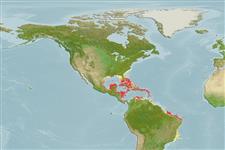Common names from other countries
>
Ophidiiformes (Cusk eels) >
Ophidiidae (Cusk-eels) > Ophidiinae
Etymology: Parophidion: Greek, para in the side of + Greek, ophidion, diminitive of ophis = serpent (Ref. 45335).
Environment: milieu / climate zone / depth range / distribution range
Écologie
marin démersal. Subtropical
Western Atlantic: Bermuda, Bahamas and southern Florida (USA) to northern South America.
Taille / Poids / Âge
Maturity: Lm ? range ? - ? cm
Max length : 10.0 cm TL mâle / non sexé; (Ref. 7251)
Description synthétique
Clés d'identification | Morphologie | Morphométrie
Scales on body in anguilloid pattern, somewhat overlapping, interorbital region scaled, opercle naked, cheeks, top of head forward to centre of interorbital region scaled; ethmoid spine reduced to a low bump; gill chamber and guts pale; no pyloric caeca; males with posterior opening on swim bladder; the two pelvic fin rays equally long or very nearly so (Ref. 34024).
Uncommon species (Ref. 34024). Adults occur in shallow coastal waters, usually in turtle grass beds (Ref. 7251). Oviparous, with oval pelagic eggs floating in a gelatinous mass (Ref. 205).
Life cycle and mating behavior
Maturities | Reproduction | Spawnings | Egg(s) | Fecundities | Larves
Nielsen, J.G., D.M. Cohen, D.F. Markle and C.R. Robins, 1999. Ophidiiform fishes of the world (Order Ophidiiformes). An annotated and illustrated catalogue of pearlfishes, cusk-eels, brotulas and other ophidiiform fishes known to date. FAO Fish. Synop. 125(18):178p. Rome: FAO. (Ref. 34024)
Statut dans la liste rouge de l'IUCN (Ref. 130435)
CITES (Ref. 128078)
Not Evaluated
Menace pour l'homme
Harmless
Utilisations par l'homme
Pêcheries: sans intérêt
Outils
Articles particuliers
Télécharger en XML
Sources Internet
Estimates based on models
Preferred temperature (Ref.
115969): 25.4 - 28, mean 27.2 (based on 214 cells).
Phylogenetic diversity index (Ref.
82804): PD
50 = 0.7500 [Uniqueness, from 0.5 = low to 2.0 = high].
Bayesian length-weight: a=0.00257 (0.00122 - 0.00544), b=3.17 (2.99 - 3.35), in cm Total Length, based on LWR estimates for this (Sub)family-body shape (Ref.
93245).
Niveau trophique (Ref.
69278): 3.4 ±0.6 se; based on size and trophs of closest relatives
Résilience (Ref.
120179): Haut, temps minimum de doublement de population inférieur à 15 mois (Preliminary K or Fecundity.).
Fishing Vulnerability (Ref.
59153): Low vulnerability (10 of 100).
